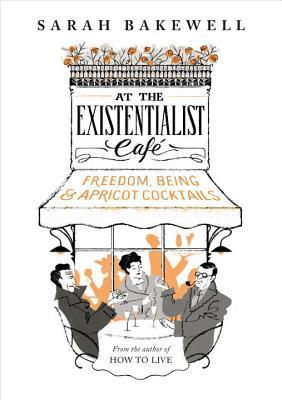 Sarah Bakewell promises freedom, being and apricot cocktails at this here café, but I think what we get is actually – and I kid you not – a love story. Which is not to say that love stories and freedom, being, and apricot cocktails are mutually exclusive – least of all that last one, I’m sure!
Sarah Bakewell promises freedom, being and apricot cocktails at this here café, but I think what we get is actually – and I kid you not – a love story. Which is not to say that love stories and freedom, being, and apricot cocktails are mutually exclusive – least of all that last one, I’m sure!
I’m going to argue my case. It’s a love story firstly between Bakewell and the existentialist philosophers (and philosophy), but also, through the process of becoming witness to that story, between the reader and – I suppose it’s a pick and choose, but I truly do think he’s the protagonist here – Jean-Paul Sartre. Don’t get me wrong, now. Bakewell does an extremely good job picking apart existentialism and following it through the ages, from its inchoate stages through its evolution in Sartre and other customers of this existentialist café over time. She details their relationships with each other as they become friends, break with each other, try again, and break it off for good. There is a good mix of 1)historical context, which I appreciated a lot and helps give depth to the characters, allowing you to understand what may have served as possible motivators, 2)character development, and 3)the understanding that ideas are not static entities, are subject to change, and sometimes defy attempts at definition. Bakewell embraces #3 from the very start, and having read this book cover to cover, I leave satisfied not being able to provide a clean and simple definition of what exactly constitutes existentialism. But let’s talk about #2: character development.I’m not kidding when I say character development. I know these are (were) real people who lived real lives with real facts in the real world, but Bakewell has a sense for fleshing out dry facts into full-fledged characters. I say this not with the intention of invoking any sort of hierarchical notion of real people > characters, but rather in terms of Bakewell doing a spectacular job making these people seem alive, with all their charm and foibles (along with the downright nasty and questionable decisions). At the Existentialist Café reads like a novel, despite its not-novel-like organization, and it’s because of Bakewell’s ability to make the reader fall in love with the characters, in spite of – or because of – their shortcomings.
Take Sartre, for example. He makes his fair share of questionable decisions, especially towards the end, maybe midway through, his life. However, these missteps only serve to endear him to the reader (unless it’s just me). It’s the questionable decisions especially that make the story all the more tragic; it’s kind of like what I would imagine watching a train wreck would feel like: you know what’s going to happen, but you can’t look away and you can’t stop it either, and there’s this sinking feeling before… well you get the idea. Whether it’s actually a tragedy or not I’ll leave up to you to decide, but if you are in agreement with me about the tragedy, I would suggest you give No Longer Human by Osamu Dazai a try. We don’t have the novel, but we do have volumes one and two of the manga adaptation in our collection!